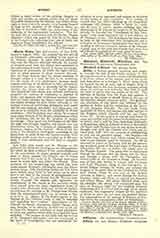

Affinity (in the BIBLE).—Scripture recognizes affinity as an impediment to wedlock. This is evident from the legislation contained in Lev., xviii, 8, 14-16, 18; xx, 11, 12, 14, 20, 21. Unlike canonical affinity, which arises both from lawful and unlawful consummated carnal intercourse, affinity in the code of the Old Testament springs from the sponsalia only, which with the Hebrews did not differ substantially from our matrimonium ratum. The above mentioned texts forbid marriage (I) in linea recta, with stepmother, stepdaughter, grand-stepdaughter, mother-in-law, daughter-in-law; (2) in linea collaterali, with paternal uncle’s wife—aunt—(some versions include also maternal uncle’s wife), with sister-in-law, except in those cases where the lex leviratus obtains, with wife’s sister as long as the former is living. Be it remarked here that the Jews considered the relationship existing between the wife and her husband’s family as of a closer nature than that between the husband and his wife’s family.
The laws given in Lev., xviii receive sanction in Lev., xx. Death is indicated as the penalty of those who transgress the ordinances of affinity in linea recta, whereas childlessness is threatened to those who marry within the forbidden degrees in linea collaterali. It is well to note that childlessness here referred to means either that the offspring shall be looked upon as illegitimate, or that they shall be considered as the legitimate descendants of the deceased uncle or brother. In either case they would be childless before the law, and their possessions would pass into another family. No sanction is given to the law prohibiting a man from marrying simultaneously two sisters. From the fact that the separation of the spouses is nowhere enjoined in case they married within the forbidden degree in linea collaterali, we may infer that the existence of these impediments did not void the matrimonial contract. The sanction of the laws in question is, with one exception, rather severe. What reasons dictated this rigour? Moral propriety is one. The expressions “heinous crime” and “great abomination” are tokens of the inspired writer’s unfeigned abhorrence of the acts qualified by them. The welfare of family life is another. People closely related as a rule dwell together, especially in Eastern countries. Were it not for the abovementioned prohibitions disorders fatal to family life would creep in under the pretext of future marriage. Maimonides and St. Thomas insist strongly on this reason. The Bible finally intimates that the observance of these laws will differentiate the chosen people from heathen nations (Lev., xviii, 24). The New Testament does not contain any legislation on this subject, but narrates two incidents where the laws of Leviticus were violated. Herod Antipas married Herodias, the wife of his brother Philip (Matt., xiv, 3, 4; Mark, vi, 17-18; Luke, iii, 19), contrary to Lev., xviii, 16. For, even granting that Philip was dead, a much controverted question, the lex leviratus did not obtain since Herodias had a daughter by Philip. The man of Corinth had his father’s wife (I Cor., v, 1) in opposition to Lev., xviii, 8.
E. HEINLEIN

